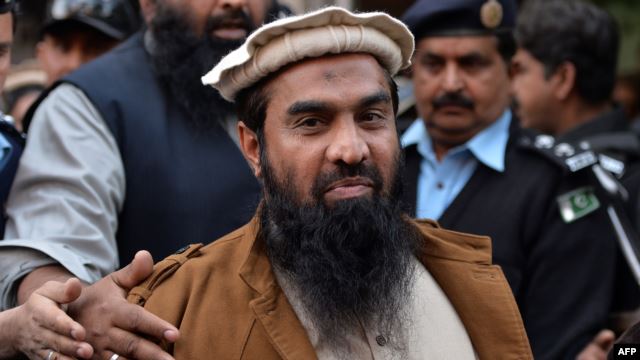U.S. witness says he worked with Pakistanis on Mumbai attack
| Publisher | Radio Free Europe/Radio Liberty |
| Publication Date | 9 February 2016 |
| Cite as | Radio Free Europe/Radio Liberty, U.S. witness says he worked with Pakistanis on Mumbai attack, 9 February 2016, available at: https://www.refworld.org/docid/570cdeb424.html [accessed 4 November 2019] |
| Disclaimer | This is not a UNHCR publication. UNHCR is not responsible for, nor does it necessarily endorse, its content. Any views expressed are solely those of the author or publisher and do not necessarily reflect those of UNHCR, the United Nations or its Member States. |
February 09, 2016
By RFE/RL
 A U.S. witness says he worked with Zaki-ur-Rehman Lakhvi, alleged mastermind of the 2008 Mumbai attacks.
A U.S. witness says he worked with Zaki-ur-Rehman Lakhvi, alleged mastermind of the 2008 Mumbai attacks.
An American convicted for his role in the 2008 Mumbai terrorist attacks that killed 166 people told an Indian court that he attended training camps run by alleged masterminds in Pakistan and communicated with intelligence officers in that country.
David Coleman Headley, sentenced to 35 years in prison by a Chicago court in 2013 for helping plan the attacks, recently turned prosecution witness for a Mumbai court trying Abu Jundal, an Indian also accused of involvement in the attacks.
A U.S. citizen of Pakistani descent, Headley had admitted to his role in the attacks and offered to turn state witness to avoid the death penalty. The Mumbai court granted him immunity from prosecution for disclosing what he knew about the attacks.
In his deposition before the court on February 8 via a video link from the United States, Headley, a member of the Pakistan-based Lashkar-e Taiba group, said two attempts to attack Mumbai failed before a third succeeded in November 2008.
He told the court that he traveled to India seven times to scout for potential targets for the attacks. In one aborted attack, he said a boat the men were using overturned after hitting rocks and their weapons were lost at sea.
According to Indian prosecutor Ujwal Nikam, Headley told the court he had attended camps run by the Lashkar group's founder, Hafiz Saeed, and commander Zaki-ur Rehman Lahkvi, the masterminds of the attacks.
Nikam said Headley was also in communication with officials from Pakistan's spy agency, Inter-Services Intelligence, whom he identified as "Major Iqbal" and "Major Ali."
Nikam said after more than five hours of questioning Headley that "it is clear that there is a close nexus" between Pakistani intelligence and the Lashkar group.
India has accused Pakistan's intelligence service and army of coordinating the Mumbai assault, a charge repeatedly denied by Islamabad.
Headley's deposition will resume on February 9, Nikam said.
Headley, 55, was born Daood Gilani to an American mother and Pakistani father, who was a former diplomat. He changed his name to David Coleman Headley in 2006 to avoid drawing suspicion from Indian officials on his frequent travels there as a purported American tourist.
Ten attackers staged a three-day siege beginning on November 26, 2008, attacking landmarks and luxury hotels in Mumbai and leaving 166 people dead.
Nine militants were killed by police. In 2012, India executed the only surviving gunman, Ajmal Kasab. Seven men, including Lashkar commander Lakhvi, are on trial in Pakistan.
With reporting by dpa, AFP, and Reuters
Link to original story on RFE/RL website
